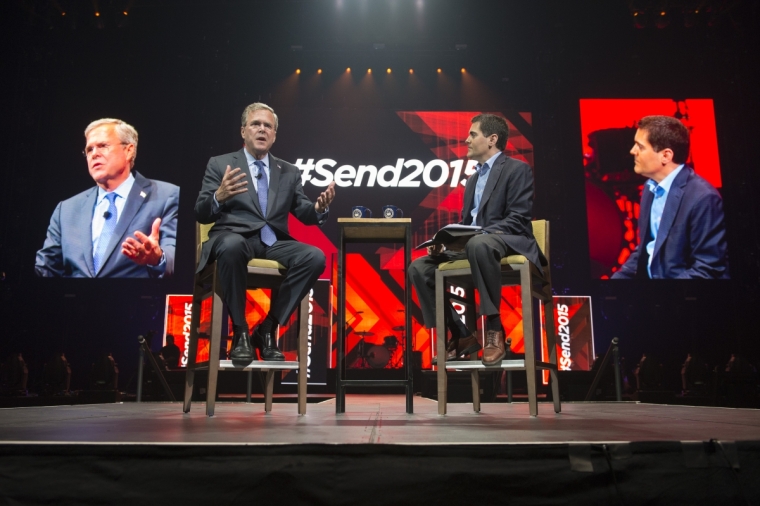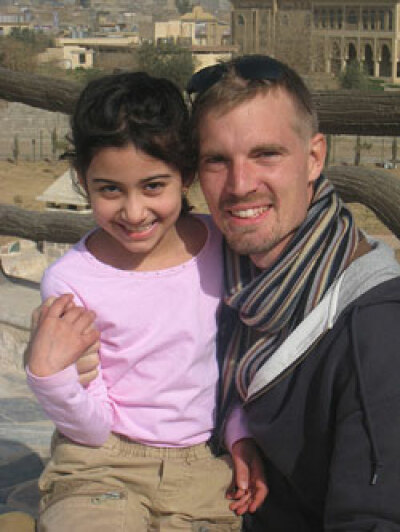'Spiritual qualifications for office' not important for SBC civil forum at SEND Conference, Russell Moore says

NASHVILLE, Tenn. (Christian Examiner) -- Addressing moral and social issues that matter to evangelicals - GOP presidential hopefuls former Gov. Jeb Bush and Florida Senator Marco Rubio spoke to over 13,000 Southern Baptists in a civil forum Aug. 3.
Russell Moore, president of the SBC's Ethics and Religious Liberty Commission, interviewed Bush in person during the 2015 Send North America Conference in Nashville, just two days prior to the first Republican presidential debate, while a videotaped interview was shown of Moore and Rubio.
At a press conference after the interviews, Moore said he invited all candidates polling at 10 percent or higher to be interviewed, including Hillary Clinton, and perhaps Ben Carson, he said, declined.
As for Southern Baptist GOP candidates, specifically former Arkansas Gov. Mike Huckabee, Sen. Ted Cruz, and Gov. Rick Perry, Moore told Christian Examiner he did not invite them because that would have turned the forum "into a moment of identity politics instead of a time of conversation."
"[T]o do so would have sent a signal that we were looking for spiritual qualifications for civil office," Moore said.
In the interview Bush didn't skip a beat in speaking frankly about Planned Parenthood when Moore referenced the failed effort the day before in congress to "defund Planned Parenthood" in the Senate. "Shouldn't we make that an issue and say, 'Not one more red cent for Planned Parenthood?'" Moore asked.
"The next president should veto Planned Parenthood," Bush said, downplaying criticisms that a move to do so would be declaring, "a war on women."
"I have the benefit of having been governor, and we did defund Planned Parenthood when I was governor," Bush said. "[A]bortion should not be funded by the government, any government, in my mind."
Noting he was unsure if the federal government needed to spend $500 million dollars on healthcare for women – given "community health organizations" and other means of healthcare that exist, Bush also spoke about his intervention to fund programs for developmentally disabled children and adults in Florida – as one example of the way care is shown for life from "beginning to the end" in relation to the "most vulnerable" in our society.

"I can promise you there will not be $500 million going to Planned Parenthood," he said.
Moore referenced the Planned Parenthood videos in his question to Rubio, but did not ask the Senator about defunding the organization. Instead he asked if having a Republican or Democratic president mattered since America has had both since the legalization of abortion.
"First of all, what those videos ... reveal is that abortion in America is a money making industry," Rubio said.
Pointing to polls indicating fewer younger Americans favor abortion than do their parents — and technology that shows "a living human being is a real person with a soul and the right to live and prosper and fulfill their God-given rights," Rubio said ultimately "changing hearts and minds" is the beginning of the end.
TAX EXEMPTIONS
Noting the importance of tax exemptions for churches, schools and other religious and community organizations and the ability of the government to grant, and thereby withhold such exemptions, Moore asked both candidates how they would make sure the government does not have de facto control over these organizations.
Rubio and Bush both said they would start by having an Internal Revenue Service commissioner who would not strip the tax-exempt status of a non-profit organization because of its moral stance – citing the importance of religious liberty.
From that point on, each candidate talked about the importance of Supreme Court appointees, legislation which champions religious freedom, and protections for basic liberties.
In opening remarks, Bush said these are important discussions to be had in America. "We need to sort this out in a way that there is tolerance and understanding for other people's views.
"I know of no movement in American that does more for America, that does more for the common good, than our faith community does," Rubio said.
RELIGIOUS MINORITIES IN THE MIDDLE EAST
On religious minorities in the Middle East, Bush said it is "tragic" to see what is happening in places like Iraq, where his daughter in law's parents were born, in Syria, Nigeria, Egypt and elsewhere – when "America leads from behind."
"We are not the world's policeman, but we are the world's leader, and that leadership needs to be beyond security," Bush said. "That needs to be about the values that are really important to us."
Bush drew several rounds of applause from the crowd at his remarks on military intervention – and on his remarks related to Israel.
"The two countries in the world that will protect Christians in the places of great vulnerability are Israel and the United States -- and Israel should not do this on its own," he said.
Rubio likewise gave strong voice to a foreign policy supporting military action in the Middle East against ISIS.
RACISM IN AMERICA
Bush agreed with Moore there is a "quieter but insidious form" of racism that still exists in America. "I don't think that's the norm," he said, however, talking of police brutality, adding quickly, "when it happens there should be swift justice for sure."
Pointing to the need for bi-partisanship on a variety of issues, Bush said he believes in "restorative justice. He used as an example the first faith-based prison in Florida where there is a hope offenders will attend church services.
Bush also briefly interjected his views on immigration. "The great number of people coming here want to provide for their families," he said, noting he supports border security and does not believe in sanctuary cities.
Rubio said he has no doubt there are "lingering effects" of "systemic discrimination" in this country. "We have to do something honestly to address this as a society," he said.
CIVILITY
"Harsh language is wrong," Bush noted, when discussing political differences. "To govern the right way, we have to unite and not divide."
Rubio shared a similar view, noting "God loves Hillary Clinton as much as He loves you or me or anybody else. ...
"We can't lose our focus in the big picture of eternity and salvation. ... It's a sliver of time. ... We are here today and gone tomorrow. ... Beyond the political elections, there is something much bigger that needs to be a larger focus of our lives," Rubio said.
The Ethics and Religious Liberty Commission hosted a one-day The Gospel & Politics conference Aug. 5 in Nashville.
Related Articles
Bush announces run, warns of impact of Clinton on religious belief